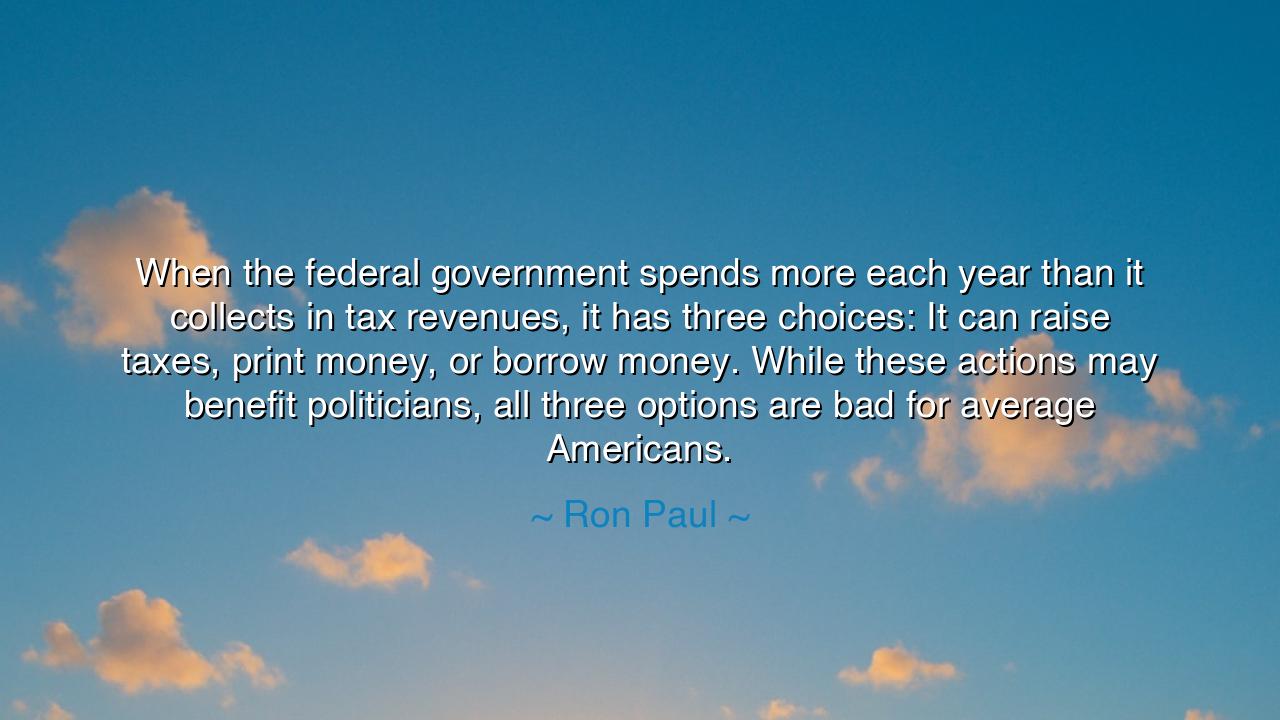
When the federal government spends more each year than it
When the federal government spends more each year than it collects in tax revenues, it has three choices: It can raise taxes, print money, or borrow money. While these actions may benefit politicians, all three options are bad for average Americans.






The economist and statesman Ron Paul, a man devoted to the principles of liberty and fiscal honesty, once declared: “When the federal government spends more each year than it collects in tax revenues, it has three choices: It can raise taxes, print money, or borrow money. While these actions may benefit politicians, all three options are bad for average Americans.” These words, simple in structure yet heavy with consequence, strike at the heart of economic truth. They unveil the moral decay that accompanies fiscal irresponsibility — the habit of governments to spend beyond their means, disguising the cost with promises and illusions. Paul’s statement is not only an economic observation, but a warning — that when rulers manipulate money, it is the people who pay the price.
To understand the meaning of this quote, one must see it as a map of deception. Governments, like households, cannot forever spend what they do not possess. When their appetite exceeds their income, they must choose among three poisons. The first, raising taxes, takes openly from the people, reducing their liberty and prosperity. The second, printing money, steals in secret, as inflation erodes the value of every dollar in every pocket. The third, borrowing, postpones the pain but enslaves future generations under mountains of debt. Each method feeds the ambitions of politicians, who seek short-term applause at the expense of long-term ruin. Yet all three diminish the common man, the worker, the saver, the family who lives with honesty while their government lives by credit.
The origin of Paul’s warning comes from his years as a physician turned congressman, a man who witnessed firsthand the corrosion of economic virtue in the halls of Washington. A student of Austrian economics, he believed that sound money and limited government were essential to liberty. His quote reflects the philosophy of thinkers like Ludwig von Mises and Friedrich Hayek, who taught that when money is debased, society itself begins to crumble. For when government creates currency from nothing, it destroys trust — the invisible foundation upon which economies and civilizations are built. In this sense, Paul’s words are not merely about numbers, but about morality — about honesty, restraint, and the sacred duty of stewardship.
History bears grim testimony to his wisdom. Consider Weimar Germany in the 1920s, when the government, drowning in debt after war, turned to the printing press for salvation. What followed was the most terrifying inflation in modern history. Paper marks became worthless; savings evaporated overnight; a loaf of bread cost billions. Out of that chaos rose desperation and tyranny — for when people lose faith in their money, they soon lose faith in law and reason. Similarly, in more recent times, nations like Argentina and Venezuela repeated this folly, proving that economic law, like gravity, punishes those who defy it. Ron Paul’s warning stands as a shield against such collapse, urging nations to learn what history has already written in fire.
But his insight also carries a quieter truth about the nature of political temptation. The politician, unlike the craftsman or farmer, creates nothing; his power depends on appeasing the present while deferring the reckoning to the future. Thus, deficit spending becomes a tool of illusion — the art of pleasing all and hurting none, at least for a time. Yet the burden never vanishes; it is merely shifted. The inflation that follows punishes savers and workers, eroding their purchasing power. The debt that follows burdens their children. And the taxes that follow crush innovation and freedom. Thus, every act of reckless spending is a theft from those who have not yet spoken.
The lesson of Paul’s words is eternal: honesty in finance is the foundation of freedom. A nation that lives beyond its means will soon find its people living beneath theirs. True prosperity does not come from printing or borrowing, but from producing — from the sweat, skill, and thrift of free individuals. When government forgets this, it consumes the wealth of its citizens as a fire consumes dry grass — swiftly, silently, completely. The moral path, therefore, is one of discipline: to demand balanced budgets, sound money, and transparent leadership that does not trade truth for popularity.
And so, my child, remember this teaching: when rulers promise everything without cost, they are not giving — they are taking. Do not be lulled by comfort or blinded by abundance that is born of debt. Live within your means, and demand that your government do the same. Support leaders who prize stewardship over spectacle, who seek to serve rather than to spend. For when a nation forgets the virtue of restraint, it invites the ruin of empires before it. But when its people remember, when they insist upon honesty in both money and governance, then liberty — that most delicate flame — burns bright once more, unshaken by the storms of deceit.






AAdministratorAdministrator
Welcome, honored guests. Please leave a comment, we will respond soon